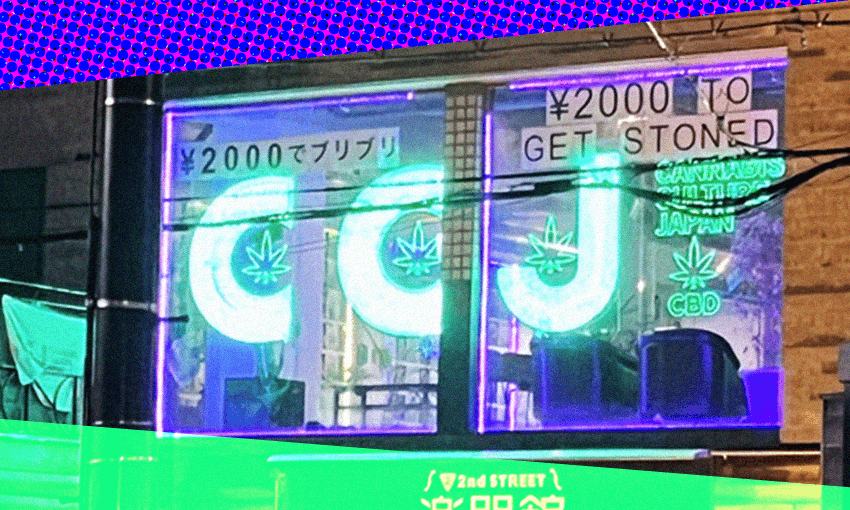New Zealand recently loosened restrictions around CBD, meaning it could be sold in chemists here soon. On a recent trip to Japan, Thomas Giblin got a glimpse of how our weird regulatory limbo on cannabis could play out.
Aotearoa’s regulatory regime for medical cannabis has taken its next step. CBD products will no longer be prescription only, as the chemical has been reclassified as a restricted medicine. Soon, CBD-infused products may appear at your local Chemist Warehouse, but Chris Luxon has just been voted in as prime minister, and the National Party leader has stated he won’t consider pardoning or decriminalising the possession or use of cannabis if elected.
So, I might be able to walk into a chemist and buy rainbow-coloured CBD gummies, but if I’m caught possessing cannabis, even a recreational amount, it’s a crime? I thought navigating the murky maze of Aotearoa’s cannabis-related drug laws was difficult, but then I arrived in the neon-drenched streets of Japan.
Being chronically online meant I’d seen plenty of TikToks warning me to stay away from drugs while in Japan. The country’s drug laws are incredibly punitive: you can be jailed for up to seven years for possessing cannabis. Recently, a Police Ten 7-type news segment appeared on Japanese national television, showing a dozen cops surrounding two young men as sirens flicker. You’d think they’ve committed an unspeakable crime, but just one bud of cannabis and a single joint was the cause of all the commotion.
With this prior knowledge, I knew if I was to enjoy a wild night out in Shinjuku and not end up in trouble with the law I should stick to Strong Zeros (the 9% canned chūhai have a cult following for a reason). But when I landed at Haneda Airport, fresh off a hellish 13-hour flight without adequate legroom, I didn’t expect to see a CBD shop and cafe. Was this the lack of sleep? No, my eyes weren’t deceiving me: a shop was selling Earl Grey CBD cookies as jetliners passed overhead. I’d expected to go weeks without seeing the plant, but within one hour of arriving in Japan, I was confronted with an array of CBD-infused baked goods.
Later that day, as I walked around the streets of Tokyo, CBD shops and cafes were a dime a dozen. Storefronts were lit up by dazzling green lights, drawing in curious tourists like myself. I was shocked you could walk in off the street and purchase any of the various CBD products they had for sale. In exchange for a glowing Google review, some shops would let you have a few hits of their CBD vape pens. Despite Japan’s zero-tolerance policy on cannabis and the social stigma attached to it, these sleek stores aren’t only popular with gaijin. Salarymen, all dressed in dark business suits with scuffed dress shoes, also made purchases. They often opted for the more discreet items.
In Osaka, the burgeoning cannabis scene was even more visible, particularly in certain neighbourhoods. Like K Road, America-mura – a hotspot for youth culture – had a concentrated number of shops selling cannabis-related paraphernalia. If you needed a bong, rolling paper, or a hoodie with Snoop Dogg smoking a fat one, you just had to make the trip from your hotel. Hilariously, one CBD store across from a police station even had a sign saying “¥2000 to get stoned.”
Akin to the BZP craze of the 2000s, Japan’s various CBD shops and cafes exist because of a legal loophole. Products made from cannabis are illegal, but synthetic cannabinoids manufactured to mimic THC, the psychoactive element in cannabis, are legal. I soon began to draw similarities between Aotearoa’s and Japan’s drug culture. Of course, there are differences, but conservative lawmakers in both countries have shifted drug policy away from evidence-based reform. Despite the changing public attitude towards weed, many insist on clinging to outdated ideas about drug use.
Like BZP and synthetic cannabis in Aotearoa, the Japanese authorities will eventually catch up. Right now, it is like a game of Whac-A-Mole, as when they ban one synthetic THC cannabinoid, another one pops right back up alongside several more stores.
What can we learn? As CBD products will no longer be prescription-only in Aotearoa soon, drug education becomes paramount. When using these products, our whānau and friends must be given the resources to make informed decisions. Whilst clean and neatly lit, the CBD shops and cafes in Japan seemingly pop up with little oversight. They can make untested claims to make a few quick dollars.
Is it worth using these products if you don’t know what’s in them? One American tourist seemed to think so as he lurched around a kebab shop, boisterously showing off the CBD vape pen he’d just bought. Before long, he was passed out, having to be Ubered home by his partner.
This “green rush” will soon hit Aotearoa. So, as I walk into a pharmacy to try using a CBD product for my anxiety, I want to know that it’s not just the money the producer cares about. I want to make an informed decision, unlike that stoned tourist who ruined my enjoyment of possibly the best falafel I’ve ever had.



